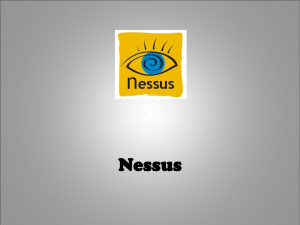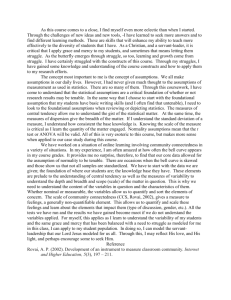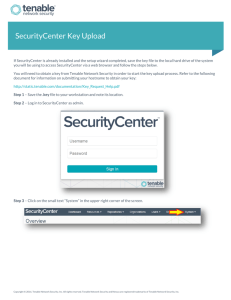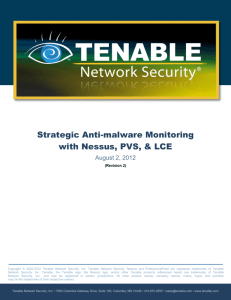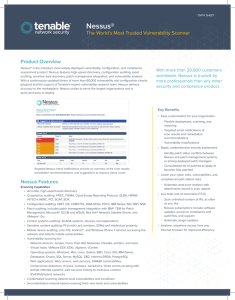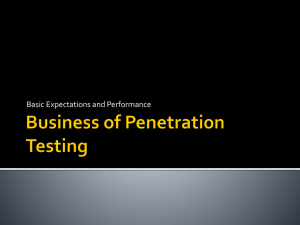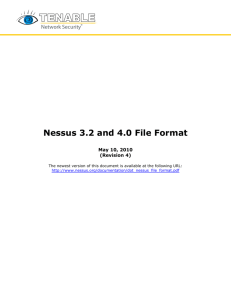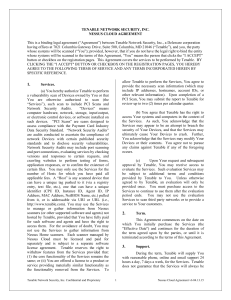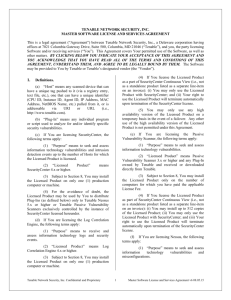Using Nessus in Web Application Vulnerability Assessments
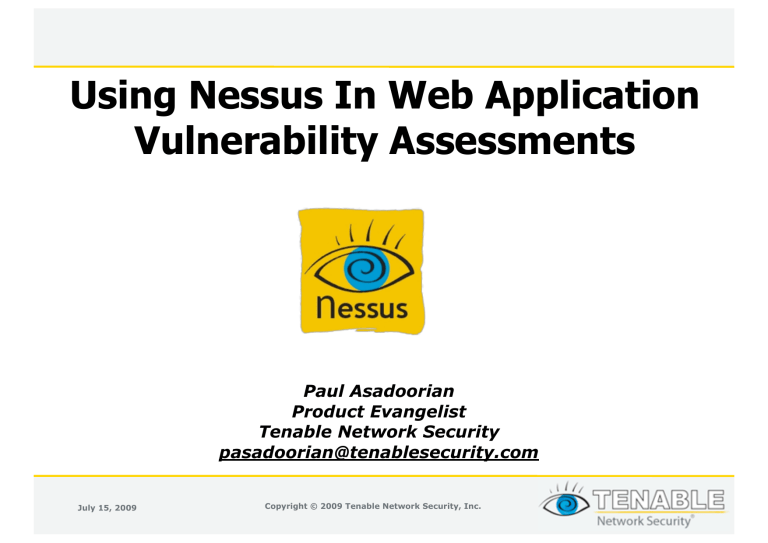
Using Nessus In Web Application
Vulnerability Assessments
July 15, 2009
Paul Asadoorian
Product Evangelist
Tenable Network Security pasadoorian@tenablesecurity.com
Copyright © 2009 Tenable Network Security, Inc.
About Tenable
• Nessus vulnerability scanner,
ProfessionalFeed
• Security Center provides “Unified Security
Monitoring”
• LCE - Log Correlation Engine
• PVS - Passive Vulnerability Scanning http://www.tenablesecurity.com/demos/
Copyright © 2009 Tenable Network Security, Inc.
July 15, 2009
Who Am I?
• Product Evangelist at Tenable Network
Security
– I’m a “blogger”, technical blog postings on how to use Tenable products
– Assist in research and development of products
– Tell people how to use the product
• PaulDotCom
– Weekly podcast and webcasts
– Community for security professionals
– Author, “Linksys WRT54G Ultimate Hacking”
• In The Trenches…
– Worked for University for 7 years
– Firewall admin, IDS analyst, response team leader
– Penetration tester
Copyright © 2009 Tenable Network Security, Inc.
July 15, 2009
Why Use Nessus To Test Web Apps?
• Test your own web applications to justify budget for 3rd party web application testing
• Find flaws before your audit to save time & money
• Implement a process for continually finding and fixing web application flaws
• Test the environment that supports you web applications
Copyright © 2009 Tenable Network Security, Inc.
July 15, 2009
Using Nessus In Web Application Tests
• Network-based testing
– Find vulnerabilities in web server software
– Detect CGI programs and vulnerabilities
– Configurable “fuzzing” of CGI programs
– Detect vulnerable web servers and apps
– Integration of 3rd party tools such as Nikto
July 15, 2009
Application checks are useful for “blind” tests
Copyright © 2009 Tenable Network Security, Inc.
Using Nessus In Web Application Tests
• Local patch/configuration auditing
1) Detect missing patches for most major operating systems and Linux distributions
2) Compare settings to industry standard hardening guidelines, including:
• Operating system
• Web server
• Database
3) Create your own custom checks
Copyright © 2009 Tenable Network Security, Inc.
July 15, 2009
Using Nessus In Web Application Tests
• Use Nessus as part of you web application assessment strategy
• Performing exhaustive tests for all XSS or
SQL injection scenarios can take days!
– Nessus allows you to adjust timers to control scan duration
– Consider multiple scan configurations
• Supplements manual web application testing
– Required for a complete audit, especially session manipulation
Copyright © 2009 Tenable Network Security, Inc.
July 15, 2009
Selecting Targets: Virtual Hosts
• Web server virtual hosts can mask applications
• Several enumeration techniques available
– MS Live
– DNS
– Banner grabbing http://lab.lonerunners.net/blog/virtual-host-and-dns-names-enumeration-techniques
July 15, 2009 Copyright © 2009 Tenable Network Security, Inc.
Differences Between IP and Hostnames
IP of web server
Medium level vulnerabilities
Domain name specified
High risk vulnerability
July 15, 2009 Copyright © 2009 Tenable Network Security, Inc.
Web App Testing With Nessus: Network Policies
• CGI abuses - This plugin family checks for anything that is ‘CGI’ related, unless it is XSS (and only a
XSS vulnerability), in which case it falls into the "CGI abuses : XSS" family. These checks use a combination of detection techniques, including checking version of the application and testing for the actual vulnerability. The attacks include software detection, information disclosure, XSS, SQLi, LFI, RFI, overflows and more.
• CGI abuses : XSS - Specific CGI checks for reflective and persistent XSS vulnerabilities in common web applications.
• Database - Typically a web server will run a database that is used by various web applications.
• FTP - Web pages need to be updated, and FTP is a popular protocol used to allow your web developers to send files to the server.
• Gain a Shell Remotely & Gain root remotely - If you gain root/shell remotely, resolve this problem before the application is tested.
• General - Contains the operating system fingerprinting plugins, including ones that will identify the OS over HTTP. Identifying the underlying operating system is very important for web application testing, as it will determine the syntax of commands sent via injection (command and SQL) attacks.
• Remote file access - Includes checks for specific web server/application vulnerabilities that lead to remote file disclosure.
• Service detection - Contains checks for several different services, including detecting Apache running
HTTPS, HTTP CONNECT proxy settings and other services that may host web applications.
• Web servers - Plugins in this family detect approximately 300 specific vulnerabilities in popular web servers, such as Apache, IIS and generic vulnerabilities associated with the HTTP protocol itself.
Copyright © 2009 Tenable Network Security, Inc.
July 15, 2009
Advanced Options - Global variable settings
• “Enable CGI scanning” -
Sends various test strings to
CGI programs to find vulnerabilities & enables CGI plugins
• “Enable experimental scripts” - Test for vulnerabilities that use new techniques
• “Thorough tests (slow)” -
Crawls and tests more web pages, enables more exhaustive
SQL injection testing
Copyright © 2009 Tenable Network Security, Inc.
July 15, 2009
Advanced - Web Mirroring
• Web mirroring - Specify the web server directory you wish to scan
• Forces Nessus to crawl it AND test it for CGI vulnerabilities
– Results are sent to the torturecgi nasl for testing
If you know where the applications live, specify them in the list.
Exclude other directories to save time.
Copyright © 2009 Tenable Network Security, Inc.
July 15, 2009
Nessus: Nikto Integration
• Included with Nessus in the “CGI Abuses” family is “Nikto (Nasl Wrapper)”
– Runs Nikto against the target(s)
– “nikto.pl” must be in your path on the Nessus server
– Works with Nikto 2.03 (latest, download from http://www.cirt.net/nikto2
Modified /etc/init.d/nessus http://blog.tenablesecurity.com/2008/09/using-nessus-to.html
July 15, 2009 Copyright © 2009 Tenable Network Security, Inc.
Example Nikto Results
July 15, 2009 Copyright © 2009 Tenable Network Security, Inc.
Nessus: HMAP HTTP Server Detection
• Based on research from UCDavis
• Nessus (Michel Arboi) includes this research based on reference implementation
– http://ujeni.murkyroc.com/hmap/
• Works similarly to TCP/IP-based OS fingerprinting
• Trying to hide your web server by changing the banner? Think again...
• Must enable “Thorough checks” and disable “Safe
Checks”!
Copyright © 2009 Tenable Network Security, Inc.
July 15, 2009
Web Application Test Settings
NOTE: THIS SCRIPT IS NOT MEANT
TO REPLACE HUMAN EXAMINATION
OR A PROPER APPLICATION
AUDIT. THIS SCRIPT IS DESIGNED
TO DO RUDIMENTARY TESTING
ONLY
• Complete overhaul in
June 2009
• Reads results of web mirror then tests:
– SQL injection
– Cross-site Scripting
– Remote File Inclusion
– Directory Traversal sequences
– Encoded Directory Traversal sequences (e.g., ..%2F..%2Fetc)
– Command injection (e.g., |/bin/id)
Copyright © 2009 Tenable Network Security, Inc.
July 15, 2009
Web App Tests
• Specify how long
Nessus should test web apps
• Applies to one web site’s ports and applications for each attack
• Enable/disable testing embedded web servers
Copyright © 2009 Tenable Network Security, Inc.
July 15, 2009
Web App Tests
• “Combinations of arguments value” determines how
Nessus will test each parameter of the CGI
• Very powerful feature, not found or configurable in some web application testing tools
• Has a huge impact on time...
Copyright © 2009 Tenable Network Security, Inc.
July 15, 2009
Combinations Testing: One Value
• Suppose Nessus found a CGI, vuln.php, that takes three parameters
– ID - 1,2
– CAT - 10,11
– COLOR - r,b
• Nessus will send just two attack strings in this example:
– ATT1 =<script>alert("foo");</script>
– ATT2 = <body onload=alert("foo");>
Valid Request:
/vuln.php?id=1&cat=10&color=r
Copyright © 2009 Tenable Network Security, Inc.
July 15, 2009
“One value” (Single Mode)
/vuln.php?id=ATT1&cat=10&color=r
/vuln.php?id=ATT2&cat=10&color=r
Both “cat” and
“color” never change
/vuln.php?id=1&cat=ATT1&color=r
/vuln.php?id=1&cat=ATT2&color=r Several other combinations not tested!
/vuln.php?id=1&cat=10&color=ATT1
/vuln.php?id=1&cat=10&color=ATT2
Nessus uses the first value found in web mirroring as the static value for all testing
Copyright © 2009 Tenable Network Security, Inc.
July 15, 2009
All Pairs
/vuln.php?id=ATT1&cat=10&color=r
/vuln.php?id=ATT1&cat=11&color=r
Nessus uses first value discovered in web mirror
/vuln.php?id=1&cat=ATT1&color=r
/vuln.php?id=2&cat=ATT1&color=r
/vuln.php?id=1&cat=10&color=ATT1
/vuln.php?id=2&cat=10&color=ATT1
Ex. We never test when “color=b” and “cat=11”
/vuln.php?id=1&cat=10&color=ATT1
/vuln.php?id=1&cat=11&color=ATT1
.......
Some variables remain static, but more thorough than single mode
Copyright © 2009 Tenable Network Security, Inc.
July 15, 2009
All Combinations Mode
/vuln.php?id=ATT1&cat=10&color=r
/vuln.php?id=ATT1&cat=10&color=b
/vuln.php?id=ATT1&cat=11&color=r
/vuln.php?id=ATT1&cat=11&color=b
/vuln.php?id=ATT2&cat=10&color=r
/vuln.php?id=ATT2&cat=10&color=b
/vuln.php?id=ATT2&cat=11&color=r
/vuln.php?id=ATT2&cat=11&color=b
......
Ex. We test each combo
All combinations of all parameters are tested with each attack string.
This can be time consuming!
Copyright © 2009 Tenable Network Security, Inc.
July 15, 2009
Web App Tests
• To help save time, tell Nessus when to stop
• Applies to each host being tested
Copyright © 2009 Tenable Network Security, Inc.
July 15, 2009
Example: Moth
July 15, 2009 Copyright © 2009 Tenable Network Security, Inc.
Manual Testing Of Remote File Include
July 15, 2009 Copyright © 2009 Tenable Network Security, Inc.
Example: Cross-Site Scripting
July 15, 2009 Copyright © 2009 Tenable Network Security, Inc.
Manual Testing: XSS
July 15, 2009 Copyright © 2009 Tenable Network Security, Inc.
Nessus Credentialed Scanning Web Apps
• Nessus can audit the local configuration, primary areas are:
– Local Checks - Provides patch audit of the system
– OS Specific Audits - Audit files compare your operating system configuration to a standard
– Web Server Audits - Compares your web server configuration to a standard
– Database Audits - Checks the database configuration against a known standard
Copyright © 2009 Tenable Network Security, Inc.
July 15, 2009
Local Testing With Nessus
• Nessus scanning with credentials allows you to audit patch levels and configuration
• Local checks help with web application assessments by identifying missing patches:
– Apache
– PHP
– IIS
– OpenSSL
– MySQL
Copyright © 2009 Tenable Network Security, Inc.
July 15, 2009
Audit Policies
• Allow you to compare your system settings to pre-defined standards
– Must be a Nessus ProfessionalFeed customer
– Scans must contain credentials for targets
– Credentials do not need administrative privileges
• Check for things like safe_mode
– This is great for large organizations with multiple environments and little control over the developers, e.g. Universities
OWASP Check Failing
Copyright © 2009 Tenable Network Security, Inc.
July 15, 2009
Audit Policies: Operating System
• Several different standards to choose from:
– CIS Benchmarks
• http://www.cisecurity.org/
– DISA
• http://iase.disa.mil/stigs/checklist/
CIS Benchmark Audit Failing
– GLBA
• http://www.ftc.gov/privacy/privacyinitiatives/glbact.html
– HIPAA
• http://www.cms.hhs.gov/HIPAAGenInfo/
– FDCC
• http://nvd.nist.gov/fdcc/
Copyright © 2009 Tenable Network Security, Inc.
July 15, 2009
Audit Policies: Database
• CIS_MySQL_4.1_5.1 Benchmark_v1.0.1.audit
- This database audit file implements a majority of the SQL specific checks from the CIS MySQL
4.1, 5.0, 5.1 Community Editions v 1.0.1. (Last updated February 27,
2009.)
• SQL Server 2005 CIS_SQL2005_Benchmark_v1_1 - Implements a majority of the SQL specific checks from the CIS SQLServer 2005
Benchmark v 1.1 for Windows systems. (Last updated February 4, 2009.)
Make sure the database is locked down.
Accessing the database is just as good as shell!
July 15, 2009 Copyright © 2009 Tenable Network Security, Inc.
Audit Files For Web Application Servers
• Tenable Apache Best Practices - Consists of a list of best practices checks for a host running Apache web server. (Last updated March 3, 2009.)
• Tenable IIS Best Practices - Consists of a list of best practices checks for a Microsoft IIS 6 server. (Last updated
April 1, 2009.)
• OWASP best practice recommendations - This document implements OWASP best practice recommendations for PHP.
(Last updated March 3, 2009.)
• CIS_Apache_v2_1 - This audit file implements a majority of the configuration checks from the CIS Level 1 Benchmark/
Apache v2.1 guide for Linux systems. (Last updated October
21, 2008.
The above audit files can be downloaded from https://plugins-customers.nessus.org
Copyright © 2009 Tenable Network Security, Inc.
July 15, 2009
Create Your Own!
• You can easily create your own audit policies
• Tailor them to your policies and procedures
– You do have those, right?
• Even better, take an existing one and modify it!
Almost as fun as building your own wireless policy enforcer!
Copyright © 2009 Tenable Network Security, Inc.
July 15, 2009
Example: Replacing Base64 with DIGEST
• Base64 encoded passwords traveling across the network are “bad”
• They are sometimes found trying to protect web applications
• I wrote an audit file entry for Apache servers
– Check to see if Base64 is being used type : FILE_CONTENT_CHECK_NOT description : "Check if AuthType entry in httpd.conf is correctly set" file : "httpd.conf" search_locations : "/usr/local/apache/conf:/etc/httpd" regex : "^[^#]*AuthType .*" expect : "AuthType Basic"
Copyright © 2009 Tenable Network Security, Inc.
July 15, 2009
Web App Assessment: Where we are going...
• Nessus 4 is much faster, we now have bandwidth to do more, patch audits and probes
• Assisting with PCI DSS audits and continuing to keep up with PCI as a standard
• Researching more ways to use white box testing (.audit files) to audit web servers
• Enhancing our passive network analysis and log correlation tools to look for more web attacks
• We have a strong web application assessment methodology created from both previous experiences and working with the plugins. We are working on getting
Nessus 4 to provide more extensive coverage
Copyright © 2009 Tenable Network Security, Inc.
July 15, 2009
Playgrounds For Your Web App Assessments
• Virtual Machines
– DVL (Damn Vulnerable Linux)
• http://www.damnvulnerablelinux.org/
– Moth
• http://www.bonsai-sec.com/en/research/moth.php
• Stand-alone Applications
– Stanford SecuriBench
• http://suif.stanford.edu/~livshits/securibench/
– WebGoat
• http://www.owasp.org/index.php/Category:OWASP_WebGoat_Project
– Mutillidae
• http://www.irongeek.com/i.php?page=security/mutillidae-deliberatelyvulnerable-php-owasp-top-10&mode=print
• Remote Sites
– Acunetix:
• http://testphp.acunetix.com/
Copyright © 2009 Tenable Network Security, Inc.
July 15, 2009
Blog Posts: http://blog.tenablesecurity.com
• Scanning Multiple Apache VirtualHosts With Nessus
– http://blog.tenablesecurity.com/2009/05/scanning-multiple-virtual-hosts-withnessus.html
• Tips For Using Nessus In Web Application Testing
– http://blog.tenablesecurity.com/2009/04/tips-for-using-nessus-in-web-applicationtesting.html
• Auditing PHP Settings to OWASP Recommendations with Nessus
– http://blog.tenablesecurity.com/2009/03/auditing-php-settings-to-owasprecommendations-with-nessus.html
• Detecting Base64 Encoded Authentication Requests
– http://blog.tenablesecurity.com/2009/03/detecting-base64-encoded-authenticationrequests.html
Copyright © 2009 Tenable Network Security, Inc.
July 15, 2009
Contact pasadoorian@tenablesecurity.com
• Web: http://www.tenablesecurity.com
• Videos: http://www.nessus.org/demos
• Blog: http://blog.tenablesecurity.com
Copyright © 2009 Tenable Network Security, Inc.
July 15, 2009
